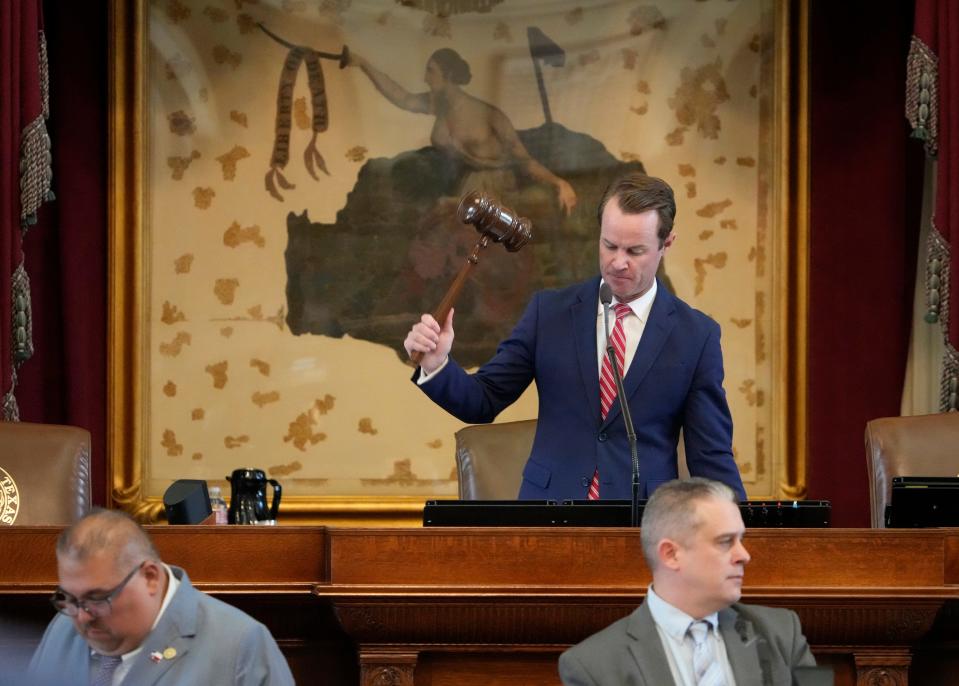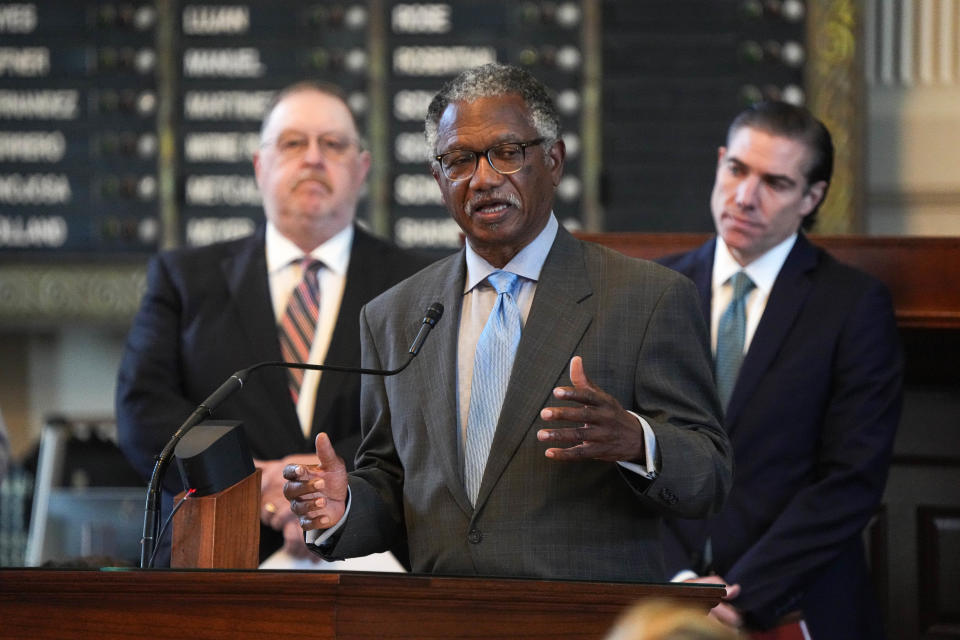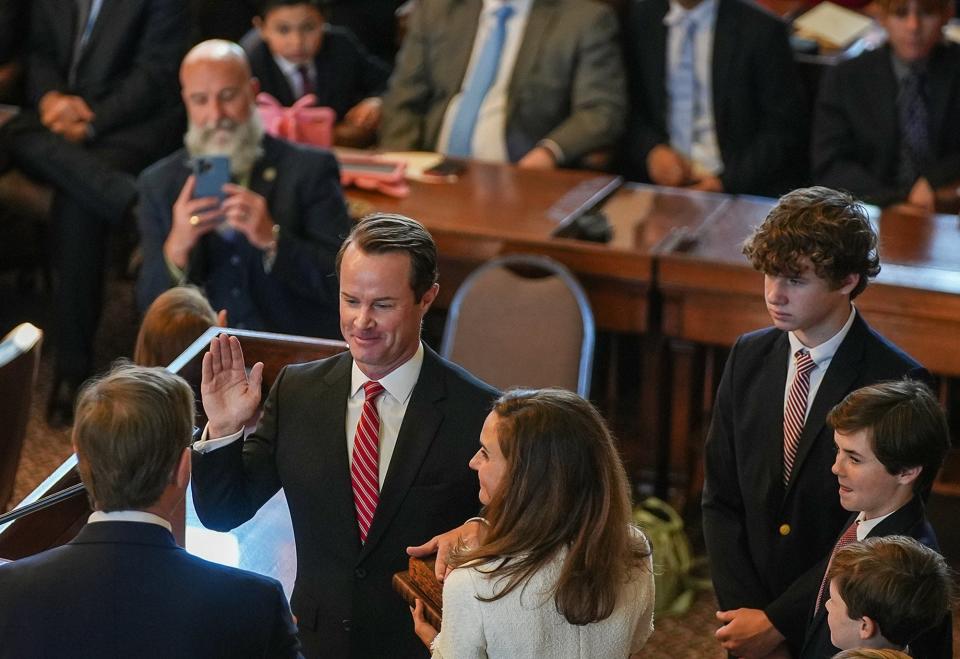Republican infighting, battle over Texas speakership results of national political trend
Republicans vying for a seat in the Texas House are looking to settle a political score during next month's primary runoff, but in the lead-up to the partisan showdown a game plan for revamping the chamber's procedures in favor of the GOP is already underway.
Looking to advance their push to exclude Democrats from policy decisions and leadership positions, consolidate control of selecting the House's leader and topple the tenure of House Speaker Dade Phelan, R-Beaumont, two dozen conservative candidates, including a handful of incumbents, have signed a "Contract with Texas" to do just that.
The fervor of far-right candidates in this election cycle — spurred by the House's vote last year to impeach Attorney General Ken Paxton and its opposition to Gov. Greg Abbott's effort to establish a school voucher program — collided with a preexisting and broader effort by a select number of House Republicans seeking to discredit Phelan's conservative bona fides in hopes of pushing the chamber farther to the right.

While the Capitol is no stranger to playing host to hyperpartisan politics, the effort to unseat Phelan and alter a long-standing practice of affording the minority party several committee chairmanships could have an expanded impact on the chamber's ability to legislate.
Dr. álvaro Corral, assistant professor of political science at the University of Texas Rio Grande Valley, said Phelan is walking a hard line in trying to keep a flame of bipartisan in the chamber alive while facing the political battle of his life amid a runoff election and a challenge to his speakership.
More: Border security, property taxes, school choice on tap for Senate's 2025 agenda
"He's sort of trying to do some gymnastics here to sort of maintain this, this tradition," Corral said of the House's practice of having committees chaired by members of both parties.
Republicans' Contract with Texas to control speakership vote, eliminate bipartisan chairmanships
In a letter released April 8, the conservative consortium complained that the 2023 legislative session directed by Phelan was "marked by obstruction, dysfunction, and a lack of fundamental fairness in application of the House's Rules."
More: Ted Cruz granted extension on FEC personal finance statement; Democrats pounce
As a result, the roughly two dozen signers are asking other Republicans to join the pledge to only "solicit support for Speakership from Republican members," "end the practice of awarding Democrats with committee chairmanship," and "ensure all GOP legislative priorities receive a floor vote before any Democrat bill."
"For years Texas House Speakers have betrayed Republican voters by putting radical Democrats in charge and colluding with them to destroy liberty," Rep. Brian Harrison, R-Midlothian, a mainstay of the House GOP's far-right wing, said in releasing the contract. "That insanity must end."
In the past, Republicans have worked with Democrats in the House to pass legislation to alter the state's constitution, which requires a higher vote threshold, and to build coalitions when far-right members of the chamber disagreed with the politics of more moderate Republicans.

The demands of the coalition could also result in broader implications than those directly tied to the chamber's political environment, as limiting chair positions strictly by party might result in the further exclusion of diverse voices spanning Texas' varying communities, Corral said.
"How many nonwhite committee chairs would we have in a very diverse Texas? How many women would we have serving as chairs?" Corral said. "And so, you know, this is just not necessarily a good look, in terms of the Texas Legislature, in terms of a lack of diversity that's already bad in the chamber."
In launching a challenge against Phelan for the speakership, Rep. Tom Oliverson, R-Cypress, mirrored the coalition's language last month as he announced his bid for the leadership post in 2025.
More: Candidate for speaker calls Texas House 'dysfunctional.' Congress says, 'Hold my beer'
"In a new paradigm, the Speaker should be nominated in caucus and elected on the floor with 76 votes of the majority party," Oliverson told conservatives and the media at the Texas Public Policy Foundation's annual summit last month. "The backroom deals of the past undermined collegiality and drove a wedge between members. This practice started much of the dysfunction that was on display last session."
Responding to Oliverson's announcement at the time, Rep. Trey Martinez Fischer, D-San Antonio, the leader of the Texas House Democratic Caucus, was dismissive in chiding the Republican for prioritizing "passing private school voucher scams and dissolving bipartisan leadership."

Rep. Harold Dutton Jr., D-Houston, went farther last week in writing an editorial in the Capitol insider publication, The Quorum Report, saying that altering the selection of the speaker will allow outside influencers, such as Abbott and Lt. Gov. Dan Patrick, to have sway over the leadership question as bipartisan progress grinds to a halt.
"Given today's political climate, the 2025 Session of the Texas Legislature is almost certain to be noted for either getting little to nothing done or outright chaos," Dutton wrote in response to the initial petition signatures. "While many are betting on the latter, the thirteen Republican disciples have simply decided to control the expected legislative fire by applying gasoline."
However, as Oliverson made criticisms similar to those of the signers of the Contract with Texas, although directly targeting Phelan to a lesser extent, the speaker hopeful is also walking a tight line politically as he now leads the House GOP Caucus, a main arm of the apparatus to organize, promote and elect conservative lawmakers in the House.
As the signatories of the Republican edict have chastised Phelan for affording Democratic members of the chamber too much say in policy matters, the House GOP Caucus' political action committee, which Oliverson leads after Rep. Craig Goldman of Fort Worth vacated the position to run for Congress, endorsed Phelan in a statement last week celebrating the Legislature's conservative success in the past year.
In an endorsement letter, along with several other candidates, Phelan received a nod from the caucus for being "an effective champion for conservative values."
"During the most recent 88th Legislative Session, one of the most conservative sessions in Texas history, these members made it a priority to support important measures that would ensure the growth and prosperity of the Lone Star State," the endorsement says.
More: Is a 'school choice' proposal possible in Texas in 2025? How $12M influenced GOP primaries
Attacks on Phelan and his uphill battle
In the lead-up to the March 5 primary and in its aftermath ahead of the May 28 runoff election, Phelan has chalked up the political attacks against him to outside influences seeking retribution for the chamber's vote to impeach Paxton, who was ultimately acquitted by the Senate last year, and its unwillingness to prod harder and pass Abbott's school voucher plan to spend state funds on private school tuition.
In an advertisement released Thursday by his campaign, Phelan called his challenger, David Covey, an oil and gas consultant and former Orange County GOP chairman, a "puppet for West Texas billionaires and Pennsylvania TikTok investors trying to silence Southeast Texas."

Phelan's ad refers to Tim Dunn and Farris Wilks, West Texas oil tycoons and financiers of pro-school choice candidates. Similarly, the ad calls out Jeff Yass, a Pennsylvania billionaire and a leading advocate for school choice, who contributed roughly $9.5 million to Abbott and the AFC Victory Fund to support school choice candidates in March.
As the first speaker in roughly 50 years to be forced into a runoff, Phelan will face a continued battle in trying to stave off the chamber's vocal far-right members attempting to orchestrate his ouster from leadership, if he is able to win the primary in May.
"The speakership is sort of becoming a bit of a poison chalice," Corral said, highlighting the parallels between lawmakers in Texas and in Congress who have placed the speakership as a central point of political contention.
More: Why a Texas Republican is mounting a House speakership challenge against Dade Phelan
Calling it a nationwide trend, Corral said conservative lawmakers in the state Legislature might be emboldened to challenge any speaker candidate moving forward, both as a result of former President Donald Trump's influence on the party and in hopes of exerting greater influence over the House's direction, as congressional Republicans have done over the tenures of Speaker Mike Johnson, R-La., and former Speaker Kevin McCarthy, R-Calif.
"This is sort of in keeping with what we've been seeing for the last decade or so, these challenges, these difficulties," Corral said. "But I think it's sort of reaching a new level."
This article originally appeared on Austin American-Statesman: Texas Republicans seek primary runoff wins as battle for speaker wages